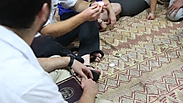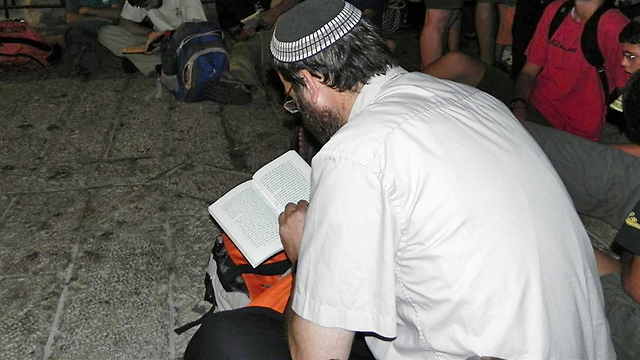
Aliyah and Tisha B’Av: The fast track to gratuitous love
Op-ed: This woeful time of year is precisely the ideal time to make aliyah. We fast on Tisha B'Av not to remember our Temples were destroyed, but because there is something in our behavior, in our national soul, that is lacking and therefore the Third Temple is not being rebuilt. Gratuitous hatred destroyed the Temples, gratuitous love will help rebuild it.
One could make the argument that the ideal time for a Jew to make aliyah would be just before Pessah, as the rainy season is ending, the weather is mild, and as symbolically one is leaving one's personal Egypt to enter our ancient homeland, just as Yehoshua and Bnei Yisrael entered Eretz Yisrael at Pessah-time.
One could then make the pilgrimage to Jerusalem as our ancestors did for about a thousand years when the the Temple existed, and following that one can celebrate Lag Ba'Omer, Shavuot (another pilgrimage festival or regel), Yom Haatzmaut and Yom Yerushalayim.
But what is far more common, at least for those with school-age children, is to make aliyah in July or August. Weather-wise it is hot and muggy, and the first Jewish calendar dates, 17 of Tammuz and Tisha B'Av, are both woeful and ill-starred days during which observant Jews fast and lament the destruction of the two Temples in Jerusalem and the period between these dates is known as the Three Weeks (Bein Hametzarim, or between the straits) during which marraiges are not celebrated, one doesn’t cut one’s hair and at the begining of the month of Av one abstains from meat and wine.
But there is room to argue that precisely this is the ideal time to make aliyah. By uprooting oneself from the comfort of your exilic life, and entering the land to rebuild it exactly during the timeframe in which one's ancestors were vanquished and the center of their lives, the Temple, was destroyed.
It’s the sweet smell of revenge that we have waited 2,000 years for, and we now come with pride, to a prosperous independent state. Our journey has come full circle. And yet this same oleh may still fast twice during his first month in Israel! An outsider would surely say that he/she has gone bonkers.
Since my family is from France, the outsider that comes to mind is a little man called Napoléon Bonaparte. There is an anecdote (which may or may not be true, but for our purposes does not matter) which recounts how he was going through the streets of Paris with his entourage when he heard weeping and wailing coming from a building. He sent his general to find out what it was about.
The general returned saying that it was Jews crying over their destroyed Temple. Napoleon sent him back to find out who did it and that the perpetrator would be swiftly punished. When the general informed him that it was the Roman Emperor Titus who did it 1,800 years ago, Napoleon exclaimed, "A nation that cries and fasts for over 1,800 years for their land and Temple will surely be rewarded with their Temple."
This anecdote is useful in bringing out a major difference between a holiday such as Bastille Day and Tisha B’Av. The French on Bastille Day celebrate the destruction of the prison and their subsequent freedom. By contrast, the reason we fast on Tisha B'Av is not to remember that our Temples were destroyed on the 9th of the month of Av.
We fast ultimately because there is something in our behavior, in our national soul, that is lacking and therefore the Third Temple is not being rebuilt. Fasting is supposed to spur a person to scrupulously examine his personal behavior and actions. It is said that the last temple was destroyed due to sinat chinam- gratuitous hatred. And this is the element which highlights why fasting on Tisha B’Av in Israel is a more profound experience than fasting in exile.

Knowing that it is one’s own actions while living in our homeland that will have a direct effect on whether or not the Third Temple is built, makes it all the more compelling. To combat baseless hatred we need gratuitous love (ahavat chinam). When one interacts only with one’s own group, whether they be Ashkenazi or Sephardi, religious or secular, religious Zionists or haredim, leftists or rightists, one can easily slip into the territory of gratuitous hatred.
Then one is likely to blame the other for all that is wrong, and more seriously, to hate the other just for being who they are. But if what we strive for is gratuitous love then there is a simple litmus test which will indicate whether or not we have attained this high level: If one can argue as passionately as one can and try to convince the other that your point of view is the correct one, and at the same time love that person, then you have loved gratuitously.
Rabbi Abraham Isaac Kook explained that not only does your opponent’s point of view have a grain of truth to it, but even his negative side, as you perceive it, has an element of truth to it. No one group has the absolute truth, and we know we are getting closer to the truth when it englobes the widest set of ideas.
For example, if Meretz ran the whole country, and all of Israel’s citizens subscribed to its principles, one could argue that it would not take long for things to break down. And if the haredim ran the country, and everyone lived as they do, likewise, the country would come to a halt in short order. But each of these groups' worldviews has elements of truth. Meretz focuses on human rights and social justice, the Haredim on the importance of conserving our traditions and studying Torah. One can fervently disagree with another group but still love them. This is the great challenge of Israeli society and indeed all societies.

One must never forget that the Nazis hated all Jews equally, they didn’t distinguish between the assimilated physics professor and the shtetl Jew, between the cultural Zionist and the religious Zionist. All of them suffered the same fate. Well, our undifferentiated love for all our fellow Jews must be greater than the Nazis' undifferentiated hatred.
And so the reason I fast and sit on the floor of the synagogue on Tisha B’Av in Israel is not because 2,000 years ago the Temple was burnt down, but rather because within me there is that tendency for gratuitous hatred, the tendency to stick only to my kind, as they say in Hebrew – "hu mishelanu" - he is one of us, so he’s OK.
It is for this tendency in Israel today we all have to scrutinize our thoughts and actions. The significance of Tisha B’Av in Israel is that our past misdeeds will lead to a more loving and cohesive society. This is based on the powerful Jewish ideas of tshuva (repentance) and tikkun (rectification). And the ultimate expression of these ideas is that when the Third Temple is finally built, Tisha B’Av, currently the saddest date on the Jewish calendar, according to our Sages, will turn into a great, joyful celebration.










